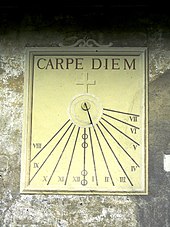CARPE DIEM
it may become increasingly hard to maintain one's sense of perspective
so it will certainly be no disgrace
if we take some advice from Horace
which he gave two millennia ago,
which he gave two millennia ago,
or so,
that is:to just go with the flow
and take your pleasures when and where you see'em,
or as he actually wrote in Latin --'carpe diem'.
Though my linguistic ability in that tongue is next to nil
I think it is advice that stands up still
repeated about 1500 years later in yet another way
by a great poet NOT named Bill,
"to gather ye rosebuds while ye may"
because it all could suddenly go downhill
as soon as the day after tomorrow
leaving little laughter but much sorrow
so remember always to take some joys while you still have breath
for inexorably, sooner or later, and for everyone, it ends with death.
HzL
5/22/17
| Robert Herrick. 1591–1674 |
| 248. To the Virgins, to make much of Time |
| GATHER ye rosebuds while ye may, | |
| Old Time is still a-flying: | |
| And this same flower that smiles to-day | |
| To-morrow will be dying. | |
| The glorious lamp of heaven, the sun, | 5 |
| The higher he 's a-getting, | |
| The sooner will his race be run, | |
| And nearer he 's to setting. | |
| That age is best which is the first, | |
| When youth and blood are warmer; | 10 |
| But being spent, the worse, and worst | |
| Times still succeed the former. | |
| Then be not coy, but use your time, | |
| And while ye may, go marry: | |
| For having lost but once your prime, | 15 |
| You may for ever tarry. |
| CONTENTS · BIBLIOGRAPHIC RECORD |
Horace
Poet
Quintus Horatius Flaccus, known in the English-speaking world as Horace, was the leading Roman lyric poet during the time of Augustus. The rhetorician Quintillian regarded his Odes as just about the o…
- Born: 65 BC · Venosa, Italy
- Died: 8 BC · Rome, Italy
Quotes
You must avoid sloth, that wicked siren.
Written works
See all (20+)Carpe diem
From Wikipedia, the free encyclopedia
For other uses, see Carpe diem (disambiguation).
Carpe diem is a Latin aphorism, usually translated "seize the day", taken from book 1 of the Roman poet Horace's work Odes (23 BC).
Contents
[hide]Translation[edit]
Carpe is the second-person singular present active imperative of carpō "pick or pluck" used by Horace to mean "enjoy, seize, use, make use of".[1] Diem is the accusative case of the noun dies "day". A more literal translation of "carpe diem" would thus be "pluck the day [as it is ripe]"-i.e., enjoy the moment.
History[edit]
Sources[edit]
Tu ne quaesieris, scire nefas, quem mihi, quem tibi
finem di dederint, Leuconoe, nec Babylonios temptaris numeros. ut melius, quidquid erit, pati. seu pluris hiemes seu tribuit Iuppiter ultimam, quae nunc oppositis debilitat pumicibus mare Tyrrhenum. Sapias, vina liques et spatio brevi spem longam reseces. dum loquimur, fugerit invida aetas: carpe diem, quam minimum credula postero. |
Ask not ('tis forbidden knowledge), what our destined term of years,
Mine and yours; nor scan the tables of your Babylonish seers. Better far to bear the future, my Leuconoe, like the past, Whether Jove has many winters yet to give, or this our last; This, that makes the Tyrrhene billows spend their strength against the shore. Strain your wine and prove your wisdom; life is short; should hope be more? In the moment of our talking, envious time has ebb'd away. Seize the present; trust tomorrow e'en as little as you may.[2] |

No comments:
Post a Comment